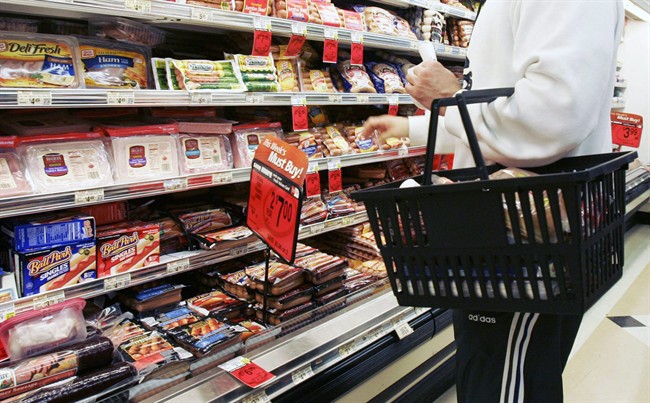Promo prices on leftover clementines from Christmas and discounted apples stored since the fall. Those are about the best offers shoppers have seen on fruits and vegetables in recent weeks as grocers grapple with a crashing exchange rate that’s sending produce prices sharply higher.

The deals on clementines and apples were what Metro Inc. had on offer at its Food Basics stores in Ontario. No Frills, owned by Loblaw, elected to offer no promotions on fruits and veggies during that same week.
“The biggest issue facing Canadian grocers is the crashing exchange rate,” Perry Caicco, a retail stock analyst at CIBC World Markets said in a new research note on Wednesday.
The loonie was down by another half a percent against the U.S. dollar Wednesday morning, trading just above 80 cents U.S.
And with lower oil prices dimming the outlook for the domestic economy, experts suggested this week the Canadian dollar will fall to as low as 75 cents by early next year.
MORE: Canadian dollar expected to slip to fresh low of 75 cents, TD says
For grocers— and by extension their customers— that’s a problem. “A lower year-over-year exchange rate boosts costs dramatically, some quickly, some slowly,” Caicco said.
Canadian supermarkets like Metro, Loblaw, Sobeys and Safeway import about 80 per cent of their fruits and vegetables and 60 per cent of consumer packaged goods. And the vast majority of those products are priced in U.S. dollars.
The loonie’s dramatic plunge of late is already broadly fanning prices higher across multiple grocery aisles. Metro, the third largest supermarket operator in the country, said this week food inflation rose 3.0 between mid-September and mid-December, its highest showing in several quarters.
The loonie has shed another five cents through January, and the downbeat outlook for the dollar is sending experts scrambling to adjust forecasts for what that means for food prices this year. Researchers at the University of Guelph will release a revised outlook for retail food prices in the coming days, an update to its initial forecast published only in December.
The researchers had been calling for food prices to rise generally by two per cent (and change) this year, with meat and produce costs rising faster by about 5 per cent.
“Increases will now likely exceed 5 per cent for several products,” Sylvain Charlebois, a professor at Guelph and food industry expert said.
MORE: Here’s what’s in store for supermarket prices next year
- Peel police chief met Sri Lankan officer a court says ‘participated’ in torture
- Budget 2024 failed to spark ‘political reboot’ for Liberals, polling suggests
- Wrong remains sent to ‘exhausted’ Canadian family after death on Cuba vacation
- Liberals having ‘very good’ budget talks with NDP, says Freeland
Grocers are expected to import more than $40 billion (U.S.) worth of food in 2015, Charlebois said. “Among the myriad food products are nuts, coffee, fish, and some speciality meats and alcohol beverages. Most importantly, due to a weaker dollar, edible vegetables, fruits and nuts are likely to see significant price increases.”
More to come
So far grocers have been able to mask price increases with tactics like deep discounts on older produce. They’ve also been absorbing some of the hit themselves – careful not to ramp prices too high too quickly.
But prices will creep ever higher in the weeks and months to come, especially now that Target is vacating its stores, a retreat that’s weakening the competitive pressures on prices.
Among the big grocery chains, “there is more and more appetite for raising prices,” CIBC analysts said Wednesday. “I.e. a lack of competition.”
While fruits and vegetables and meat are feeling the most heat, packaged foods and other “centre of the store” products, like cereal, crackers, cookies and the like will start to edge up too.
CIBC said manufacturers of brand name and store-brand products will need to raise the prices of what they charge grocers by between two and four percent to make up for the shortfall created by the falling loonie.
“Inflation will soon move to the centre of the store,” CIBC’s Caicco said.




Comments